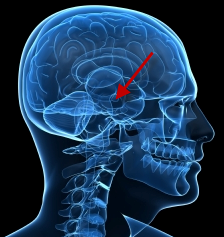Scientists discover how to slow down aging in mice and increase longevity
Blocking a specific protein complex in the hypothalamus and injecting a hormone slow aging and cognitive decline
May 3, 2013
 “Aging is a life event that is programmed
“Aging is a life event that is programmed
by the hypothalamus,” say scientists (credit: iStockphoto)
Scientists at Albert Einstein College of Medicine of Yeshiva University have found that the hypothalamus of mice controls aging throughout the body.
Their discovery of a specific age-related signaling pathway opens up new strategies for combating diseases of old age and extending lifespan.
Background: the hypothalmus and inflammation
“Scientists have long wondered whether aging occurs independently in the body’s various tissues or if it could be actively regulated by an organ in the body,” said senior author Dongsheng Cai, M.D., Ph.D., professor of molecular pharmacology at Einstein.
“It’s clear from our study that many aspects of aging are controlled by the hypothalamus. What’s exciting is that it’s possible — at least in mice — to alter signaling within the hypothalamus to slow down the aging process and increase longevity.”/.../
Blocking a specific protein complex in the hypothalamus and injecting a hormone slow aging and cognitive decline
May 3, 2013

“Aging is a life event that is programmed
by the hypothalamus,” say scientists (credit: iStockphoto)
by the hypothalamus,” say scientists (credit: iStockphoto)
Scientists at Albert Einstein College of Medicine of Yeshiva University have found that the hypothalamus of mice controls aging throughout the body.
Their discovery of a specific age-related signaling pathway opens up new strategies for combating diseases of old age and extending lifespan.
Background: the hypothalmus and inflammation
“Scientists have long wondered whether aging occurs independently in the body’s various tissues or if it could be actively regulated by an organ in the body,” said senior author Dongsheng Cai, M.D., Ph.D., professor of molecular pharmacology at Einstein.
“It’s clear from our study that many aspects of aging are controlled by the hypothalamus. What’s exciting is that it’s possible — at least in mice — to alter signaling within the hypothalamus to slow down the aging process and increase longevity.”/.../
Hypothalamic programming of systemic ageing involving IKK-β, NF-κB and GnRH
- Nature
- doi:10.1038/nature12143
- Received
- Accepted
- Published online
No comments:
Post a Comment